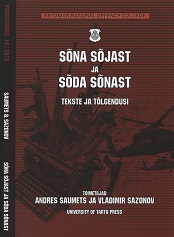Keelesõjas sõjakeel? Ohvitseride oskuskeelevaadetest
Military Language at War? The Views of Officers About Military Terminology
Author(s): Reet HendriksonSubject(s): Language and Literature Studies
Published by: Kaitseväe Ühendatud Õppeasutused
Summary/Abstract: In order to develop a functional terminology capable of being assimilated by its users it is necessary to have a broad understanding of the target group’s terminological preferences, their ideas about terminology work and their views on conceptualisation. The purpose of this approach is to shed light on the officers’ views on military terminology and their reasons behind these views. The focus of the research is based on essays and Masters theses on the subject of military terminology from students attending advanced officer training courses at the Estonian National Defence College. The article addresses the main issues of Estonian military terminology from the viewpoint of officers, their opinions as to which principles should be applied when harmonising military terminology and which arguments are employed by officers in this context. Officers share the idea that military language should be efficient which means that terms should carry one meaning, i.e., there should be a single, clearly-understood relationship between a term and the concept it represents. It appears that there is a broad variation in what officers understand by such terms. There are many different interpretations of the semantics of conceptual fields and concept relationships, and this kind of confusion exists even in fundamental concepts. Officers claim that conceptual and terminological confusion may result in chaos and defeat on the battlefield. However, the sociocognitive approach to terminology states that the possibility of such confusion among people using specialised terminology is very unlikely or even impossible. In military terminology linguistic variation often comes from different approaches to the concept, rather than from any specialist lack of knowledge. In addition, variations of terms tend to have a different cognitive value for specialists. From the viewpoint of terminology harmonization, it is therefore even more difficult to see the line between over-differentiation and cognitive need-based variations of terms. It appears from their writings that officers carefully weigh up the linguistic and conceptual advantages of the variations, and often use figurative and symbolic language, comparison, overstatement and irony when giving their reasons. In seeking to justify their statements they are often polemical and emotional.
Journal: KVÜÕA toimetised
- Issue Year: 2012
- Issue No: 16
- Page Range: 15-39
- Page Count: 25
- Language: Estonian

